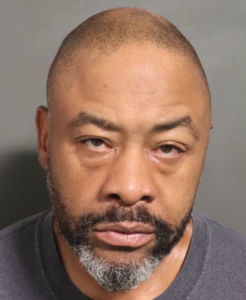Judge sentences Lawrence man to prison in burglary case, notes that ‘someone should apologize’ for his difficult childhood

photo by: Douglas County Sheriff's Office
Dandre Cordray
A man was sentenced to 45 months in prison Friday in a burglary case that was “unorthodox” from the beginning, as the judge described it.
Dandre M. Cordray, 20, was charged in December 2019 with 14 felonies — five counts of aggravated burglary, five counts of theft and four counts of burglary of a motor vehicle. He was also charged with three counts of misdemeanor theft. Just a couple of weeks later, he pleaded no contest to all 17 counts, the Journal-World reported.
Prosecutors had offered a plea agreement, but Cordray turned it down. Through the agreement, Cordray could have pleaded to three counts of aggravated burglary, and the state would have dismissed the remaining charges. The parties would have agreed to recommend a 41-month prison sentence, but Cordray would not have been allowed to ask the judge for leniency or departure from the presumed prison sentence he faced.
Defense attorney Shaye Downing instead made a case asking the judge to grant Cordray probation during a hearing Tuesday. She spoke a bit about her work on Douglas County’s Criminal Justice Coordinating Council over the past few years, and she said Cordray was an example of a person in the criminal justice system “who (has) not received the fairest opportunities to put (himself) in the best light” — the kind of case that the council aims to address.
Downing told Douglas County District Court Judge Amy Hanley about Cordray’s background, noting that in her years of practicing law, she had never heard of a case like his and didn’t even know it was possible. In one two-year span, she said, Cordray had been in more than 30 foster care placements — so many that authorities could not even find records of all of them. She said he was eventually placed back with one of his own parents, who had been found neglectful.
Downing and Rick West, of Douglas County Youth Services, both told the judge that they could not track down all the records of places where Cordray had received mental health treatment.
“What happened to him is a case study, I believe, in how our system can fail,” Downing said. She said Cordray’s sentence was an opportunity to do the things the local community has said are important, such as addressing mental and behavioral health and helping rehabilitate offenders without sending them to prison.
Chief Assistant District Attorney Eve Kemple argued that Cordray had carefully committed a slew of home burglaries, emphasizing that altogether, Cordray was charged with 17 counts that occurred over the span of a few days.
“One of the things that the defendant argued in his departure motion was that he has problems with self-control, impulse control, and I would submit to the court that his actions prove otherwise,” Kemple said.
She also read letters from multiple burglary victims who wrote about how they don’t feel safe in their own homes anymore, with one letter noting that the family checks their locks three times before they can even go to sleep now. They wrote about the trauma and the financial losses they suffered from their personal possessions being stolen.
West supervised Cordray in some juvenile cases and testified on behalf of the state Tuesday. He spoke about Cordray’s truancy, and said that teenage Cordray would start programs wide-eyed and optimistic, but when things began to require real effort, “he just stopped.”
Downing countered that it was not Cordray’s fault if the adults in his life wouldn’t take him to appointments or enable him to fulfill other obligations.
Hanley said she needed some time to consider everything she had heard. In what she said was “unorthodox,” she adjourned Tuesday’s sentencing hearing and scheduled her decision for 4 p.m. Friday.
Hanley pronounced the sentence first — standard terms under Kansas law for each of the 17 counts. She said each would run concurrently, despite Kemple’s request for some to run consecutively, for an overall sentence of 45 months, eligible for 15% good time credit.
She said she had spent many hours thinking about Cordray’s case, and that it had affected her more than many. She said she’d heard many details of the difficult childhood Cordray had, and she felt great sympathy for him.
“If that were all it took, my job would be a lot easier, and we could stop right there,” Hanley said.
“Someone should apologize on behalf of the people who should have been there from the beginning when you were very young and they weren’t there,” she told Cordray, but she said her job was to follow the law and consider rehabilitation.
Hanley said rehabilitation requires discipline and effort, and she didn’t have to speculate about how Cordray would behave on supervision because of West’s testimony. She also had concerns that his plan to seek treatment was not concrete enough and that he did not have a plan for where to live, where to work and how to provide for his three children.
Hanley said she did not grant the consecutive sentences Kemple had requested, which would have meant 86 months in prison, because she did not believe that was fair to Cordray. She said the crimes were serious, but Cordray had taken responsibility promptly after he was charged, and he had always been respectful to the court.
After the sentencing, Downing said she was heartbroken for Cordray and his family. She said that perhaps when Cordray was 16, he wouldn’t have been amenable to probation, but she didn’t believe that was still the case. She said he’d done everything that was asked of him and been cooperative with the investigation, though he would not implicate anyone else, and he had addressed his behavioral issues to the extent possible while in custody.
“I’ve never been a part of a case where I could so clearly see how a broken system leads directly to prison,” Downing told the Journal-World via email. “… This young man never had a chance, and now it will be even harder for his children (one of whom he has never been allowed to see or touch due to Covid) to succeed.”
She said that even after his sentence was pronounced, Cordray remained calm and appreciative, but she noted that she’d hoped for a different outcome for him.
“At this point, I can only wish him well and hope that while in prison he can continue to gain skills that he can use when he’s released,” she said.
Cordray was in custody of the Douglas County Jail on $50,000 cash or surety bond, but that bond was revoked after he entered his pleas almost a year ago. The sentencing hearing was delayed because the coronavirus pandemic complicated setting up Cordray’s mental health evaluations and posed challenges for scheduling in-person court hearings.
Cordray will receive credit for just more than a year served in jail, leaving him with just less than three years to serve in prison. He will have 36 months of post-release supervision. Hanley assessed a required $200 DNA database fee and $400 restitution to one of the victims, but she waived all other costs and fees.
Contact Mackenzie Clark
Have a story idea, news or information to share? Contact public safety reporter Mackenzie Clark:
Related coverage
• Jan. 13, 2020: Lawrence man pleads no contest to 17 counts, is convicted in string of burglaries
• Jan. 9, 2020: Lawrence man wants to plead guilty to 17 charges, including burglaries, auto thefts
• Dec. 31, 2019: Lawrence man arrested, charged with 17 counts in connection with alleged burglaries, auto thefts






